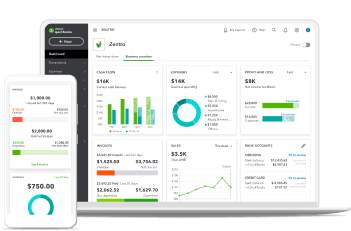The global business process outsourcing market worth is projected to reach an all-time high of $405.6 billion by 2027. That’s an unfathomable amount of money directed towards outsourcing services. It’s also a good indication that many businesses choose to outsource one or more of their business processes to an outside entity of their own.
So if you’re considering outsourcing the bookkeeping or accounting services of your small business, take a look below at what you need to know before making a decision.
What is Outsourcing?
Simply put, outsourcing is the action of one company hiring another company to perform its specific internal services. When you consider external accounting or bookkeeping services, you want to hire an outside service to fulfill all of your small business accounting tasks and finance responsibilities.
Benefits of Outsourcing Your Accounting
There are many reasons companies outsource their accounting tasks and choose to hire external services for their internal practices. The benefits of accounting outsourcing for your small business include the following:
- Saves your Company Money: Outsourcing could be the most cost-effective way of covering all accounting responsibilities without having to hire a full-time employee. A professional accountant knows the ins and outs of the financial system, meaning they could also find more tax breaks and save you more money in the long run.
- Saves you Time and Resources: As a small business owner, your time is invaluable. It could be better spent on other aspects of the company without worrying about getting financial documents in order.
- You’ll have an Expert at Your Disposal: Hiring an experienced accountant or firm to take over your company’s finances means you have extensive knowledge and expertise working for your business’s best interest.
- A Professional will Streamline the Service for You: Where it could take you weeks of stressful planning to put together a financial report, an expert could do it in days.
- Things are Less Likely to Fall Through the Cracks: If you are pulled every which way, looking after every department in your business, you could miss important deadlines. When you outsource your accounting department, you can count on having one set of eyes and a focused brain on the project that will ensure a higher standard of work with fewer financial risks.
What a Bookkeeper Does for Your Business
A bookkeeper helps with the day-to-day financial activities for your business to free up more of your time. It’s always a good idea to oversee the activities and check in with your bookkeeper through regular updates and reports. But letting a bookkeeper do the actual work is usually more efficient and lets you focus on handling your business.
What does a bookkeeper do? A good one does more than just input your monthly expenses and income, although that’s certainly an important aspect of the job. Your bookkeeper should be your part-time partner and keep you up to date, providing most, if not all of the following:
- Trade and other payable
- Trade and other receivable
- Bill payment
- Detailed general ledgers
- Payroll and check account histories
- Bank reconciliation
- Financial statements
- Customised reports
- Budget preparation
- Business and workers’ compensation insurance
- Employee health insurance
- Payroll services
- Payroll cheque writing
- Payroll tax returns
- Monthly, quarterly and annual payroll reports
- Federal, provincial and local tax reports and filings
- Business tax returns and tax planning
- Income tax returns
- Tax representation in the event of an audit
Many of these capabilities overlap with what your accountant does, although the bookkeeper provides your financial foundation. Much of the bookkeeper’s work feeds into a larger, comprehensive accounting function that your accountant completes – the most important part are your corporate and personal taxes.






